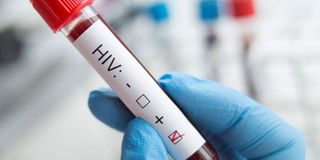People with HIV report side-effects from new drug

South Africa accounts for more than 10 percent of all HIV-related deaths and 15 percent of new infections, according to Unitaid. File Photo
What you need to know:
- Dolutegravir was introduced by government last year on recommendation by the World Health Organisation.
A number of people living with HIV/Aids have reported getting side effects from using the new antiretroviral (ARVs).
Ms Betty Oker, a member of The Aids Support Organisation (TASO), reported that some of their members were reacting to dolutegravir (DTG), a new ARV regime, which was introduced by government last year.
“Some clients are reporting pre-diabetic symptoms and a few others are reporting impotence. They would prefer to go back to their old regimens,” Ms Oker said.
Ms Erinah (not real name) said she had been using duovir-N for about eight years without any reactions until she was started on DTG in January. She said after taking the new drug for a week, she developed spots on her arms and legs, an itching skin, loss of appetite and weight.
“I have moved from hospital to hospital to see that I am put back on my old drugs but this has not been possible. I had been energetic until they changed my drugs in January. I have lost weight. My lips are all burnt. They tell me government has stopped stocking the old ARVs,” Ms Erinah told Daily Monitor.
Duovir-N is a combination of three ARV drugs; Lamivudine, Zidovudine and Nevirapine. Ms Dora Kiconco, the executive director of Uganda Network on Law, Ethics and HIV/Aids (Uganet), told Daily Monitor that they had received information from various people living with HIV who had experienced negative effects but instead government officials were ignoring the complaints, insisting it is a mindset change.
“If people don’t have information and are having adverse effects, government should get concerned. You can’t be treating people who are not part of the care plan. Those are some of the arbitrary decisions. Either way, whether it’s a good drug or bad drug, it affects their way of living and they deserve every information about it,” Ms Kiconco said in an interview.
In July, the Ministry of Health said 380,000 of the 1.1m people living with HIV/Aids had been shifted to DTG as a first and second line of treatment. However, Mr Nelson Musooba, the director general of the Uganda Aids Commission, explained that while there could be side effects, the complaints they have so far received are an indication of lack of information.
“There is a new ARV called DTG because of WHO guidelines. It is easy to swallow and cheap. It is one tablet once a day and has less side effects. Complaints on DTG have come through. But if you have somebody who has swallowed a drug for 15 years, it will take a lot of counselling to help the patient appreciate the change,” Mr Musooba said.
He, however, warned that although a drug might be good, they cannot rule out side effects, which will vary from person to person.
Dr Joshua Musinguzi, the head of HIV/Aids programme at the Ministry of Health, asked the public to embrace DTG as it is effective and easy to swallow since it is one tablet a day. He, however, said patients who present side effects should be retained on the old regime.




